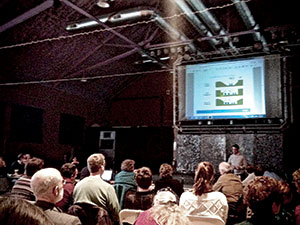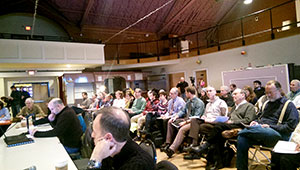
The MBTA’s Green Line Extension working group presented an update on the status of the project and emphasized the importance of frugal budgeting as the plan moves forward.
By Josie Grove
“We’ve designed a project that we can’t afford to build,” said Frank DePaola, the general manager Massachusetts Bay Transportation Authority. At last Friday’s meeting of the Green Line Extension working group, MBTA officials made it clear that the project, as it was envisioned, is no longer feasible. If the extension is to have a future, there will need to be drastic cuts to just about everything.
Last summer, the estimated cost of the Green Line Extension into Somerville out to Tufts University ballooned from $1.992 billion to nearly $3 billion. $216 million has already been spent on early action construction, so just over$800 million remains of the original budget. But it is estimated that the extension will cost double that amount.
“Step one is to get the Green Line back into budget,” said Jack Wright, the interim manager of the extension project. “Step one is going to be very brutal on this, to get the very minimum of Green Line service we can get out to Medford.” The MBTA is looking for help from the community to figure out what can be cut to reach that bare minimum. “If we get to a point where we are under budget, some of the brutality will back off,” said Wright.
“The amount of track, the length is fixed,” said DePaola. $1 billion of the project’s budget came from a Federal Transportation Administration grant, and in order to keep that funding, the Green Line will need to keep all seven of the planned stops. “Losing a billion federal dollars means losing the project.” said Wright.
 The seven stops include the Union Square spur. “If we eliminate the Union Square station, we’re in violation of the full funding grant agreement,” said DePaola. Service to Union Square might look different: a single-track spur, or a direct bus to Lechemere.
The seven stops include the Union Square spur. “If we eliminate the Union Square station, we’re in violation of the full funding grant agreement,” said DePaola. Service to Union Square might look different: a single-track spur, or a direct bus to Lechemere.
Every other aspect of the Green Line Extension project is fair game for cuts.
“There’s no silver bullet that can bring this system back in line,” said John Karn of ARUP, a private consultant brought in to help with the project. “Every aspect is to be examined.”
Stations are likely to become smaller, more like the existing aboveground Green Line stops than the Assembly Square station. “Even if we cut the stations down to bare bones, we will need to find another $700 million in order to make this project viable,” said DePaola.
The planned 80-vehicle storage and maintenance facility will likely become a smaller storage facility with only light maintenance done on the cars. The facility made up around 11% of the overall cost. “Our feeling is that it is required of the Green Line Extension, but not to the scale that it is now,” said Karn.
Reducing the cross-section of the extension is another cost-saving option. Placing the tracks closer together in a narrower, shallower trench makes it marginally less expensive to dig out the area for the tracks.
Other projects that were to be developed to the Green Line Extension are also on the chopping block, including the Community Path extension.
Finally, Wright said that the project would go out for bid again. “I believe we’re going to be recommending getting competitive bids.”
The MBTA is thinking more broadly about funding. “It is likely that at some point we’re gonna ask the entities that are building in those areas to contribute to the cost proportional to the benefit of the program,” said DePaola, but those requests cannot be made now. “We can’t ask for third-party private funding from private sector or foundations until we have a new cost estimate for new stations, narrower tracks, etc.
There will be more public meetings on March 3 and 23, at locations to be announced. There will be two more meetings in April and one more in May before the project is reported to the board.
It remains to be seen how austere the extension cuts will be, but Wright said, “It’s safe to say, as designed, we can’t afford it.”















Reader Comments